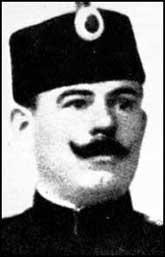Dragutin Dimitrijevic

Dragutin Dimitrijevic was born in Serbia in 1877. At eighteen Dimitrijevic went to the Belgrade Military Academy. A brilliant student, Dimitrijevic, graduated from the academy with such a good record he was immediately recruited into the General Staff of the Serbian Army. An ardent nationalist, he decided to become a specialist in terrorism.
In 1903 Captain Dimitrijevic and a group of junior officers planned the assassination of the the autocratic and unpopular king of Serbia. The group stormed the royal palace and killed both King Alexander and his wife Queen Draga. During the attack Dimitrijevic was badly wounded and although he eventually recovered, the three bullets from the encounter were never removed from his body.
The Serbian parliament described Dimitrijevic as "the saviour of the fatherland" and he was appointed Professor of Tactics at the Military Academy. He visited Germany and Russia where he studied the latest military ideas. During the Balkan Wars (1912-13) Dimitrijevic military planning helped the Serbian Army to achieve several important victories.
Dimitrijevic's main concern was the liberation of Serbia from Austro-Hungary. Dimitrijevic, who used the codename, Apis, became leader of the secret Black Hand group. In 1911 Dimitrijevic organised an attempt to assassinate Emperor Franz Josef. When this failed, Dimitrijevic turned his attention to the the heir to the throne, Archduke Franz Ferdinand. Dimitrijevic was concerned about Ferdinand's plans to grant concessions to the South Slavs. Dimitrijevic feared that if this happened, an independent Serbian state would be more difficult to achieve.
When Dimitrijevic heard that Archduke Franz Ferdinand was planning to visit Sarajevo in June 1914, he sent three members of the Black Hand group, Gavrilo Princip, Nedjelko Cabrinovic and Trifko Grabez from Serbia to assassinate him.
Unknown to Dimitrijevic, Major Voja Tankosic, was informing Nikola Pasic, the prime minister of Serbia about the plot. Although Pasic supported the main objectives of the Black Hand group, he did not want the assassination to take place as he feared it would lead to a war with Austro-Hungarian. He therefore gave instructions for Gavrilo Princip, Nedjelko Cabrinovic and Trifko Grabez to be arrested when they attempted to leave the country. However, his orders were not implemented and the three man arrived in Bosnia-Herzegovina where they joined forces with fellow conspirators, Muhamed Mehmedbasic, Danilo Ilic, Vaso Cubrilovic, Cvijetko Popovic, Misko Jovanovic and Veljko Cubrilovic.
After Archduke Franz Ferdinand was assassinated on 28th June, 1914, several members of the Black Hand group interrogated by the Austrian authorities, claimed that three men from Serbia, Dimitrijevic, Milan Ciganovic, and Major Voja Tankosic, had organised the plot. On 25th July, 1914, the Austro-Hungarian government demanded that the Serbian government arrest the men and send them to face trial in Vienna.
On 25th July, 1914, Nikola Pasic, the prime minister of Serbia, told the Austro-Hungarian government that he was unable to hand over these three men as it "would be a violation of Serbia's Constitution and criminal in law". Three days later Austro-Hungarian declared war on Serbia.
During the first two years of the First World War the Serbian Army suffered a series of military defeats. Nikola Pasic, who blamed the Black Hand for the war, decided to disband the organisation. Dimitrijevic and several of its leaders were arrested. On 23rd May 1917 Dimitrijevic was found guilty of treason and sentenced to death. Dragutin Dimitrijevic was executed on 24th June, 1917.
Primary Sources
(1) Oath sword by all members of the Black Hand group.
I, in joining the organisation "Union or Death", swear by the Sun that warms me, by the Earth that nourishes me, before God, by the blood of the ancestors, on my honour and on my life, that I will from this moment until my death be faithful to the laws of this organisation; and that I will always be ready to make any sacrifice for it.
I swear before God, on my honour and on my life, that I will take all the secrets of this organisation into my grave with me.
(2) Dragutin Dimitrijevic was interviewed by the Serbian newspaper, Pijemont Belgade, on 25th May 1912.
We do not say that this war is declared yet, but we believe that it is inevitable. If Serbia wants to live in honour, she can do so only by this war. This war is determined by our obligation to our traditions and the world of culture. This war derives from the duty of our race which will not permit itself to be assimilated. This war must bring about the eternal freedom of Serbia, of the South Slavs, of the Balkan peoples. Our whole race must stand together to halt the onslaught of these aliens from the north.
(3) Dragutin Dimitrijevic, last will and testament, 11th June, 1917.
Although sentenced to death by two competent courts, and deprived of the mercy of the Crown, I die innocently, and in the conviction that my death is necessary to Serbia for higher reasons.
I may, without wishing to, have committed errors in my work as a patriot. I may even, unknowingly, have hurt Serbian interests. But in taking any action one almost always runs the risk of being sometimes wrong. I am certain, however, of having committed no intentional errors, and of always having wished to serve no other cause than that of Serbia.
(4) Lieutenant Colonel Ljubomir Dabic, official witness of the execution of Dragutin Dimitrijevic (24th June, 1917)
The three condemned men stepped down into the ditches that had been dug for the purpose, and placed themselves in front of the stakes. Dimitrijevic on the right, Vulovic in the middle, and Malobabic on the left. After being blindfolded, Dimitrijevic and Vulovic cried: "Long live Greater Serbia!"
Malobabic succumbed after the first five shots, while the two others suffered longer, twenty shots having to be fired at each of them. No one was hit in the head. The execution was over at 4.47 in the morning.

